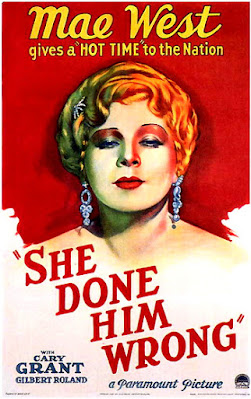Today, back in 1940, saw the release of Cary Grant's 35th film...His Girl Friday. This was the only film in which he starred with Rosalind Russell, but it his second film with Ralph Bellamy.
Summary:
When newspaper editor Walter Burns (Cary Grant) learns that his ex-wife and top reporter Hildy Johnson (Rosalind Russell) is quitting to marry Bruce Baldwin (Ralph Bellamy), he pulls out all of the stops to get her to stay. The newspaper has been championing the cause of a man on death row, Earl Williams, was convicted of killing a policeman and Walter convinces her to write a story on his case. Williams insists that the shooting was an accident and he's not crazy, as some believe.
While Hildy pursues the story, Burns has her fiancé arrested - multiple times. When Hildy gets the scoop of the year - Williams escapes from prison on the eve of his planned execution - she hides him in the police station and mayhem ensues. It also gives her a chance to decide just what she wants in the future.
"Rosalind Russell and Cary Grant play the piece for all that's in it, and get good support from Ralph Bellamy, John Qualen, Helen Mack, and Gene Lockhart."
- Philip T. Hartung, The Commonweal
Cast: Cary Grant ... Walter Burns
Rosalind Russell ... Hildy Johnson
Ralph Bellamy ... Bruce Baldwin
Gene Lockhart ... Sheriff Hartwell
Porter Hall ... Murphy
Ernest Truex ... Bensinger
Cliff Edwards ... Endicott
Clarence Kolb ... Mayor
Roscoe Karns ... McCue
Frank Jenks ... Wilson
Regis Toomey ... Sanders
Abner Biberman ... Louie
Frank Orth ... Duffy
John Qualen ... Earl Williams
Helen Mack ... Mollie Malloy
Publicity photo.
Did You Know?
It is estimated that the normal rate of verbal dialogue in most films is around 90 words a minute. In His Girl Friday (1940), the delivery has been clocked at 240 words a minute.Rosalind Russell thought, while shooting, that she didn't have as many good lines as Cary Grant had, so she hired an advertisement writer through her brother-in-law and had him write more clever lines for the dialog. Since Howard Hawks allowed for spontaneity and ad-libbing, he, and many of the cast and crew didn't notice it, but Grant knew she was up to something, leading him to greet her every morning: "What have you got today?"
Right after Williams is found in the desk, the Mayor tells Walter that he's "Whistling in the dark. Well that isn't going to help you this time. You're through." Walter says "Listen the last man that said that to me was Archie Leach just a week before he cut his throat." The famous in-joke about Ralph Bellamy's character ("There's a guy in a taxi down at the court building looks just like that movie star, what's his name? Ralph Bellamy!") was almost left on the cutting room floor: Harry Cohn, the studio head, saw the dailies and responded in fury at the impertinence, but he let Howard Hawks leave it in, and it has always been one of the biggest laughs in the film.
(According to Ralph Bellamy, the line, "There's a guy in a taxi down at the court building looks just like that movie star, what's his name? Ralph Bellamy!"!" was ad-libbed by Cary Grant.)
The play that this movie was based on ("The Front Page") had a famous last line: "The son-of-a-bitch stole my watch!" While the line and the plot points leading up to it didn't fit into "His Girl Friday", they did pay homage to it by having the first crime that Burns framed Baldwin for be the theft of a watch.
Quotes:
Walter Burns: Sorta wish you hadn't done that, Hildy.
Hildy Johnson: Done what?
Walter Burns: Divorced me. Makes a fella lose all faith in himself. Gives him a... almost gives him a feeling he wasn't wanted.
Hildy Johnson: Oh, now look, junior... that's what divorces are FOR!
Hildy Johnson: I suppose I proposed to you?
Walter Burns: Well, you practically did, making goo-goo eyes at me for two years until I broke down.
[impersonates Hildy, flutters his eyelashes]
Walter Burns: "Oh, Walter." And I still claim I was tight the night I proposed to you. If you had been a gentleman, you would have forgotten all about it. But not you!
Hildy Johnson: [hurls her purse at him] Why, you! !...
Walter Burns: [ducks and her purse barely misses him] You're losing your eye. You used to be able to pitch better than that.
Walter Burns: [on the phone] Well, Butch, where are you?... Well, what are you doing there? Haven't you even started?... Listen, it's a matter of life and death!... Well, you can't stop for a dame now! I don't care if you've been after her for six years. Butch - our whole lives are at stake! Are you going to let a woman come between us after all we've been through?... Butch, I'd put my arm in fire for you, up to here. Now you can't double-cross me... Put her on, I'll talk to her.
[talking to the woman]
Walter Burns: Oh, good evening, madam. Now listen, you ten-cent glamour girl. You can't keep Butch away from his duty!... What's that?... You say that again, I'll come over there and kick you in the teeth!... Say, what kind of language is that? Now look here you. -
[makes a noise like a horse, hangs up]
Walter Burns: She hung up! What did I say?
Lobby Cards:
Directed by Howard Hawks
Produced and Distributed by Columbia.
Running time: 92 minutes.

With Rosalind Russell and Howard Hawks.






























































